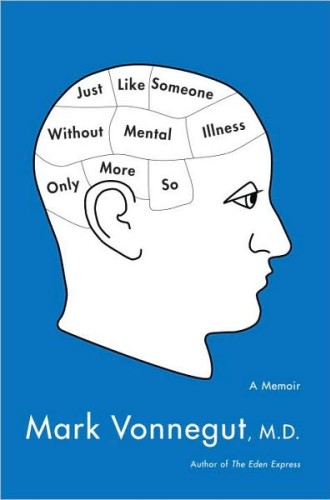Just Like Someone Without Mental Illness Only More So, by Mark Vonnegut
In this wonderfully titled memoir, Mark Vonnegut writes of his college years in the late 1960s: "At Swarthmore I majored in religion with the idea of going to divinity school and then maybe the Unitarian ministry, where I would be a comforter of the sick and disadvantaged but mostly a really good professional arguer who argued against the war and materialism."
Instead, after graduation, Vonnegut set off with friends to set up a commune in a remote area of British Columbia. They figured that saving the world might begin by saving one small corner of it.
Then, in 1971, the wheels came off. Vonnegut had a psychotic break that landed him in a psychiatric hospital in Vancouver. That was followed by two additional breaks in quick succession. The diagnosis was a combination of schizophrenia and what is now known as bipolar disorder. After those episodes Vonnegut's focus, for a time, was not on trying to save the world or even a corner of it. It took all of his energy and determination to try to save himself, or at least to get back to something resembling "normal" life.
Read our latest issue or browse back issues.
"Craziness also runs in the family," he writes, and he can trace mental illness back four generations. "We have episodes of hearing voices, hyper-religiosity, and periods of not being able to eat or sleep. These episodes are remarkably similar across generations and between individuals." His mother's family warned her about marrying his father because of the history of mental illness in his family. His father's family offered the same warning about his mother's family.
In the aftermath of these episodes Vonnegut wrote a number of articles about mental illness and chronicled his experience in The Eden Express: A Memoir of Insanity. During that time he also began to entertain thoughts of going to medical school, which could have been dismissed as delusional thinking because only a short period of time had passed since his last psychotic break. Besides, he had not been a good math and science student in college. He applied to medical schools anyway and was admitted to only one: Harvard. He comments, "It's possible the committee members of the day, back then, were distracted by the question of whether or not I was schizophrenic and overlooked my grades."
The Eden Express was published in 1975, the same year Vonnegut started medical school. The book was credited with helping many people understand the contours of mental illness at a time when there was even more of a stigma attached to mental illness than there is today. A New York Times reviewer declared it "required reading for those who want to understand insanity from the inside."
Vonnegut threw himself into his studies and then into his practice as a primary care pediatrician. After his brush with insanity, he reveled in the quotidian activities that characterize "normal" life. He might not have written another book were it not for a fourth psychotic break, which occurred 14 years after the previous episode: "When the voices came back it was like they'd never gone. . . . It was like we picked up in the middle of a conversation that had been interrupted just a few minutes earlier."
When Vonnegut tried to jump through a closed window in his home, he was taken to the hospital in medical restraints, the same hospital where he had once trained and where he had continued to work. There was no room immediately available, so they put him in the hallway where strangers stared at him and his co-workers hurried by looking afraid. That was the same month that Boston Magazine named him the best pediatrician in the Boston area. Vonnegut reflects, "It's probably possible to gain humility by means other than repeated humiliation, but repeated humiliation works very well."
We read some memoirs not out of particular interest in the author, but rather because we want to learn something about the people who populate the narrative. Some might be drawn to this book initially because they hope to learn more about author Kurt Vonnegut from his son. Such readers will be disappointed. The elder Vonnegut does lurk behind the story told here, but he is not a major character. When he does appear, he often seems peevish and self-absorbed: "Kurt was more like an unpredictable younger brother who refused to grow up than a father," the son concludes. "If I'd been raised by wolves, I would have known a little less, but not much less, about how normal people did things."
I did not find myself wanting to hear more about the author's famous father. Mark Vonnegut is the reason to read his book. By telling his own story, he offers an honest and nuanced depiction of what it is to live with mental illness. He is the kind of companionable guide who leads the reader to explore unfamiliar or even frightening territory. There is a remarkable absence of self-pity here. Instead, there are insights from the inside, like this one: "What so-called normal people are doing when they define disease like manic depression or schizophrenia is reassuring themselves that they don't have a thought disorder or affective disorder, that their thoughts and feelings make perfect sense."
As mental illness runs in Vonnegut's family, so does mordant humor: "A happy person with self-esteem wouldn't bother to have credentials as good as mine." Some people use such humor because it allows them to talk about painful subjects from a safer distance. Vonnegut's humor has the opposite effect. He uses it to invite the reader into his world more fully. This memoir traverses much the same territory as The Eden Express did 36 years ago, and it is just as helpful to those who want to understand mental illness from the inside, but it is more loosely structured, somehow freer and certainly funnier than the earlier volume.
Not all the chapters in this book focus directly on the experience of mental illness. There is, for instance, a chapter on hunting wild mushrooms and another on a trip to provide medical care in Honduras. That is part of the point. As difficult as it can be to have a mental illness, and as much as mental illness can take over a life for a time, it does not define a life. Vonnegut reflects, "None of us are entirely well, and none of us are irrevocably sick. At my best I have islands of being sick entirely. At my worst I had islands of being well." Does Vonnegut suffer from mental illness or is he a respected doctor? The answer, of course, is both, which reminds me of Winston Churchill's observation that most of the work that is done in the world each day is done by people who do not feel very well.
Many people, including pastors, are uncomfortable being around those with serious mental illness. In its severe forms, mental illness can seem like an alternative universe where the usual assumptions about how the world works do not apply. Yet at the same time, those of us who serve congregations hardly need to be reminded that mental health is a relative term. From the vantage point of a pastor, Vonnegut's observation seems both true and helpful: "There are no people anywhere who don't have some mental illness. It all depends on where you set the bar and how hard you look. What is a myth is that we are mostly well most of the time."
Vonnegut first thought he would save the world as a social-activist Unitarian minister, and later he thought he would save it by establishing a commune, but before long he left those dreams behind. Now Vonnegut clearly thinks that his ongoing work as a pediatrician, as nonrevolutionary as that might seem, is consistent with his early aspirations: "Of course I'm trying to save the world. What else would a bipolar manic-depressive hippie with a BA in religion practicing primary-care pediatrics be up to?"






